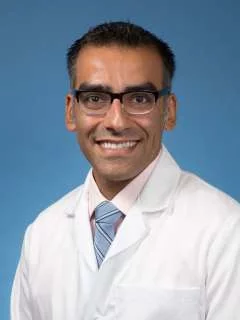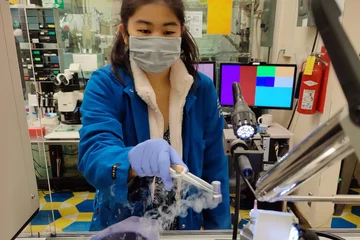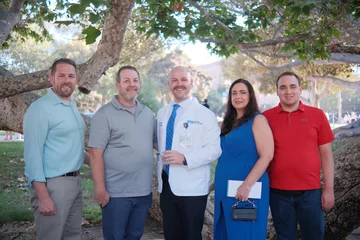What Is a Gastroenterologist?
Faculty Spotlight

What Does a Gastroenterologist Do?
A gastroenterologist diagnoses and treats conditions affecting the digestive system.
“A lot of people think we look at butts all day, but it's not like that at all,” says UCLA gastroenterologist Hamed Nayeb-Hashemi, MD.
Practicing gastroenterology, he explains, comes with variety, something he finds rewarding.
“You get to do a little bit of everything. I think that's pretty rare in medicine.”
A gastroenterologist's core functions include:
- Doing hands-on procedural work
- Consulting with patients in the office
- Providing long-term care to patients with chronic conditions
- Providing high-acuity, high-intensity hospital care
They also try to solve mysteries.
“We can’t tell some patients exactly why they feel the way they feel,” Dr. Nayeb-Hashemi says, explaining how many gastrointestinal (GI) symptoms lack an identifiable root cause.
“Patients have a hard time accepting uncertainty about their GI symptoms, but it’s really not much different from other issues, such as migraine headaches, which may not have an obvious cause on a scan.”
That’s why gastroenterologists prioritize building relationships with patients. Trust allows them to overcome skepticism and help patients manage symptoms, whether or not their causes become clear.

A Day in the Life of Hamed Nayeb-Hashemi, MD, Gastroenterologist at UCLA Health
Dr. Nayeb-Hashemi splits his time between seeing patients for general consultations and performing procedures.
“I typically spend half my time doing standard GI procedures, like an upper endoscopy to look at the stomach or a colonoscopy to look at the colon. I spend the rest in the clinic, seeing patients with a variety of digestive complaints or diseases.”
What Kind of Patients See a Gastroenterologist
A gastroenterologist will often see patients when they’re experiencing common GI symptoms. According to the American College of Gastroenterology, these symptoms include:
- Acid reflux
- Heartburn
- Chest pain
- Dyspepsia/indigestion
- Nausea and/or vomiting
- Abdominal pain
- Belching
- Bloating
- Flatulence
- Constipation
- Diarrhea
A specialist may be able to mitigate symptoms that have evaded a general practitioner.
“A patient may go and see their heart doctor for chest pain, but their test comes back normal. They’ll ask the doctor, ‘Well, then why do I have chest pain?’ and the doctor tells them to see a gastroenterologist.”
When it comes to interacting with patients, Dr. Nayeb-Hashemi says it's important to approach it as a long-term relationship and show them that you're willing to invest in understanding what’s wrong.
Patients may have to meet multiple physicians before finding the right fit.
“People fixate on the procedural aspect of treatment,” says Dr. Nayeb-Hashemi. “But any practitioner will be able to do a good procedure. Not everyone's going to be able to listen to the patient.”

Proctologist vs Gastroenterologist - What’s the Difference?
Proctologists, also called colon and rectal surgeons, and gastroenterologists often collaborate to treat patients with GI issues.
Both specialists have comprehensive expertise in the gastrointestinal system. They differ in the procedures they perform and the specific issues they treat.
Proctologists perform surgery while gastroenterologists do not. Proctologists train in general surgery before specializing in colorectal surgery. They operate to treat issues such as large polyps and colon cancer.
Gastroenterologists treat conditions that don’t typically involve surgery. Proctologists don’t treat conditions such as irritable bowel syndrome (IBS) and inflammatory bowel disease, or those affecting the stomach, pancreas, and liver. Those fall under a gastroenterologist’s domain.
How to Become a Gastroenterologist
To become a gastroenterologist, you must complete medical school, residency training in internal medicine (gastroenterology’s parent specialty), and training in a fellowship program.
Dr. Nayeb-Hashemi decided to become a gastroenterologist because he liked the field’s nuance and subjectivity.
“It’s not as cut and dry as other fields; it’s not as driven by definitive tests. There are five or six different ways to approach any given problem.”
He also liked how gastroenterology provided opportunities for new breakthroughs.
“I really liked the idea that you could still make big discoveries in GI, because the science of it is still relatively young. There’s so much unknown.”
Even today, he still sees plenty of room for evolution in the field, including:
- Understanding more about, and even manipulating, the gut microbiome
- Using artificial intelligence (AI) to enhance procedures in real time
- Advancing the treatment of GI conditions
Dr. Nayeb-Hashemi advises students interested in gastroenterology to get started early, diving into research and scholarly projects.
“You’ll need foundational research experience to have successful applications for GI fellowships, which are highly competitive,” he says. “Even though it doesn’t feel like it, at the end of the day, you have more time to conduct meaningful research as a medical student than you will as a resident.”
Getting started early helps students determine if they truly want to specialize in gastroenterology. Considering the field’s conditions, and the people, helped Dr. Nayeb-Hashemi solidify his decision.
“The GI conditions interested me. They made sense to me, but I also liked the people I was working with in my specialty rotations,” he says. “If you like the people, if your personalities mesh, then that’s a good sign you’ve found the right field.”
IBS Awareness Month
For IBS Awareness Month, Dr. Nayeb-Hashemi has an empowering message for anyone suffering from IBS symptoms.
“IBS is real. It's not something that's just in your head, and it's not a made-up problem. It's also not something you have to live with or feel hopeless about. There are things gastroenterologists can do to help you feel better.”
He says many people stop pursuing treatment because their GI issues aren’t properly explained. He encourages them to persist if something feels off.
“We have to advocate for our patients, but patients should also feel empowered to advocate for themselves.”
FAQ for Future Gastroenterologists
How Much Does a Gastroenterologist Make?
According to Medscape compensation data, the average annual gastroenterologist salary in the U.S. is $453,000.
What Characteristics Make Someone a Good Gastroenterologist?
Dr. Nayeb-Hashemi says an effective gastroenterologist will:
- Be good at dealing with uncertainty
- Be empathetic
- Be a good listener
- Have good manual dexterity, which helps when manipulating scopes
Are there subspecialties within the field of gastroenterology?
Dr. Nayeb-Hashemi says there’s usually room to sub-specialize in gastroenterology, especially at an academic medical center.
Formally recognized gastroenterology subspecialties include hepatology, the study of liver diseases. Students may also specialize in less formal ways by focusing on a specific functional GI disorder.



